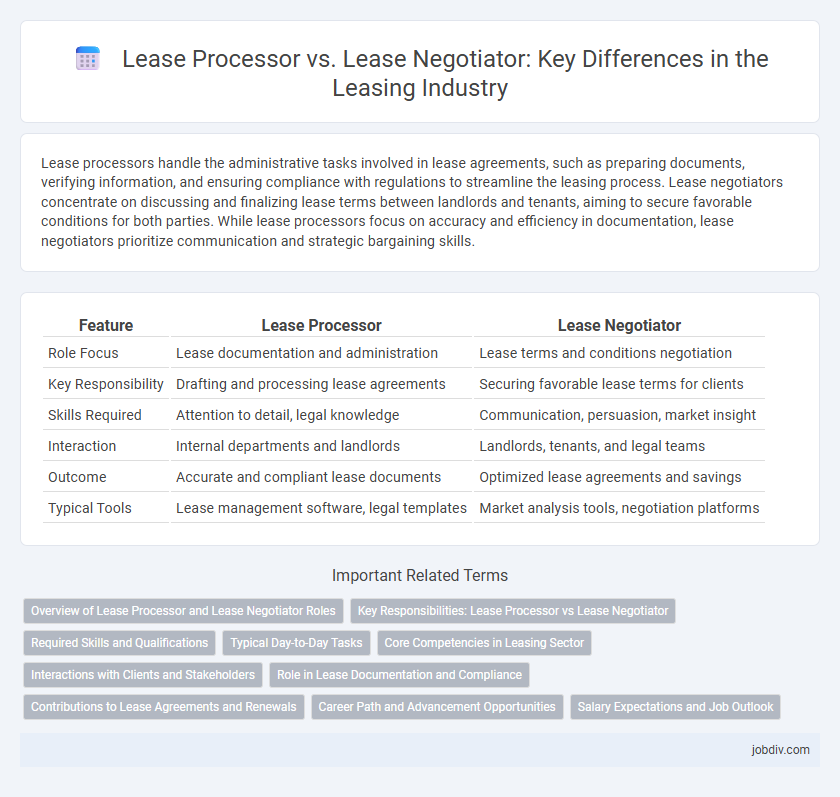Lease processors handle the administrative tasks involved in lease agreements, such as preparing documents, verifying information, and ensuring compliance with regulations to streamline the leasing process. Lease negotiators concentrate on discussing and finalizing lease terms between landlords and tenants, aiming to secure favorable conditions for both parties. While lease processors focus on accuracy and efficiency in documentation, lease negotiators prioritize communication and strategic bargaining skills.
Table of Comparison
| Feature | Lease Processor | Lease Negotiator |
|---|---|---|
| Role Focus | Lease documentation and administration | Lease terms and conditions negotiation |
| Key Responsibility | Drafting and processing lease agreements | Securing favorable lease terms for clients |
| Skills Required | Attention to detail, legal knowledge | Communication, persuasion, market insight |
| Interaction | Internal departments and landlords | Landlords, tenants, and legal teams |
| Outcome | Accurate and compliant lease documents | Optimized lease agreements and savings |
| Typical Tools | Lease management software, legal templates | Market analysis tools, negotiation platforms |
Overview of Lease Processor and Lease Negotiator Roles
Lease processors handle the administrative tasks of lease agreements, including document preparation, data entry, and coordination between tenants and landlords to ensure lease accuracy and compliance. Lease negotiators focus on the strategic aspect of leasing by discussing terms, rates, and conditions with clients to secure favorable agreements and maximize value. Both roles are essential in the leasing process, with lease processors ensuring operational efficiency and lease negotiators driving deal success.
Key Responsibilities: Lease Processor vs Lease Negotiator
Lease Processors focus on managing lease documentation, verifying tenant information, and coordinating lease execution to ensure accuracy and compliance throughout the leasing cycle. Lease Negotiators specialize in drafting and revising lease terms, engaging with tenants and landlords to finalize agreements that align with strategic business goals. While Lease Processors emphasize administrative efficiency, Lease Negotiators prioritize contract terms and stakeholder satisfaction.
Required Skills and Qualifications
Lease Processors require strong organizational abilities, attention to detail, and proficiency in document management software, with a focus on verifying lease agreements and ensuring compliance with company policies. Lease Negotiators need exceptional communication, interpersonal, and analytical skills, along with experience in contract law and market analysis to effectively negotiate favorable lease terms. Both roles demand knowledge of leasing regulations and the ability to collaborate with legal and real estate teams to finalize agreements.
Typical Day-to-Day Tasks
Lease Processors handle document preparation, verification, and compliance checks to ensure lease agreements are accurate and legally sound. Lease Negotiators focus on communicating with tenants and landlords, discussing terms, and resolving disputes to finalize lease conditions. Both roles require detailed record-keeping and coordination with legal and financial teams to facilitate smooth lease transactions.
Core Competencies in Leasing Sector
Lease processors excel in document management, ensuring accuracy in lease agreements and compliance with regulatory standards, facilitating smooth transaction workflows. Lease negotiators specialize in client communication, leveraging market analysis and strategic bargaining skills to secure favorable lease terms and maximize value for stakeholders. Both roles demand strong attention to detail, knowledge of leasing laws, and proficiency in contract administration to support successful lease execution.
Interactions with Clients and Stakeholders
Lease processors ensure accurate documentation and compliance by managing client records and coordinating with stakeholders behind the scenes. Lease negotiators engage directly with clients and stakeholders to discuss terms, resolve concerns, and finalize agreements, focusing on building relationships and driving successful transactions. Effective communication skills are essential for both roles to facilitate smooth leasing processes and maintain stakeholder satisfaction.
Role in Lease Documentation and Compliance
Lease Processors are responsible for accurately preparing and reviewing lease documentation to ensure all terms comply with regulatory standards and company policies. Lease Negotiators focus on structuring lease agreements by negotiating terms with tenants or landlords while maintaining legal and contractual compliance. Both roles collaborate to guarantee that leases are thorough, enforceable, and aligned with compliance requirements throughout the leasing process.
Contributions to Lease Agreements and Renewals
Lease Processors ensure accuracy and compliance in lease agreements by managing documentation, verifying contract details, and coordinating with legal teams to streamline renewals. Lease Negotiators drive value by leveraging market data and tenant needs to secure favorable terms, optimize rent structures, and facilitate mutually beneficial lease renewals. Together, these roles enhance the efficiency and effectiveness of lease agreement execution and renewal strategies.
Career Path and Advancement Opportunities
Lease Processors typically handle documentation and administrative tasks, providing foundational experience in lease management that can lead to roles such as Lease Administrators or Compliance Specialists. Lease Negotiators engage directly in contract discussions and client relations, building skills that pave the way toward higher positions like Lease Managers or Real Estate Agents. Career advancement often depends on mastering negotiation strategies and regulatory knowledge, with negotiators generally having faster access to leadership roles due to their client-facing expertise.
Salary Expectations and Job Outlook
Lease processors typically earn an average salary ranging from $35,000 to $50,000 annually, while lease negotiators command higher wages, usually between $50,000 and $70,000 due to their direct involvement in contract discussions and client interactions. The job outlook for lease negotiators is projected to grow faster than that of lease processors, driven by increasing demand in commercial real estate and leasing industries. Strong negotiation skills and knowledge of lease agreements enhance career advancement opportunities and salary potential in this sector.
Lease Processor vs Lease Negotiator Infographic

 jobdiv.com
jobdiv.com